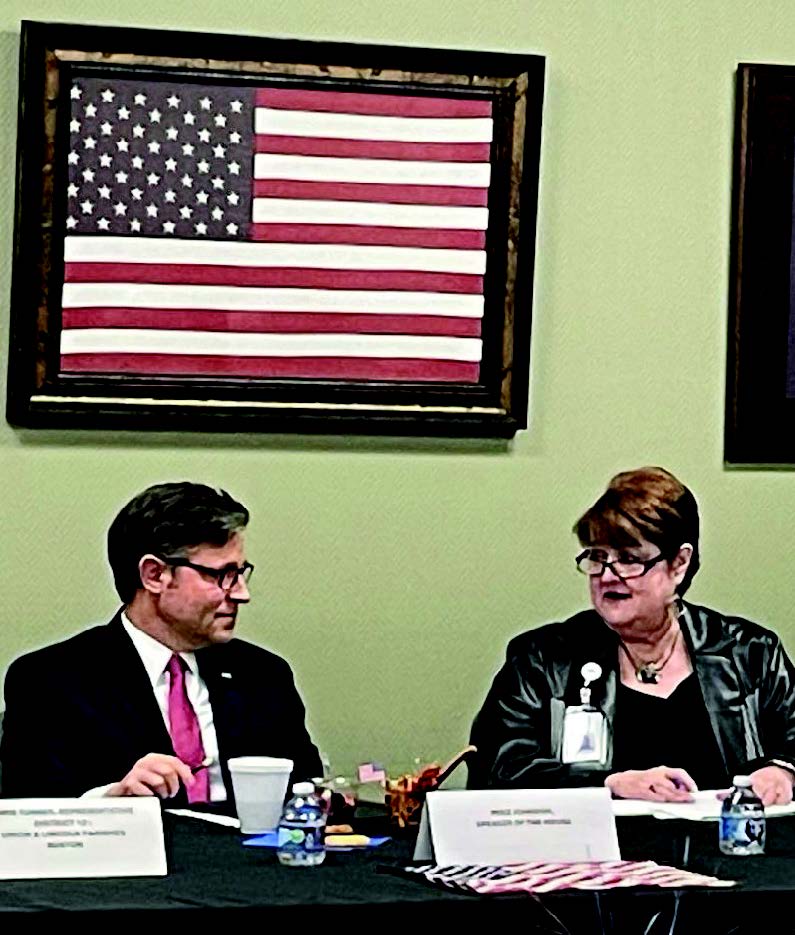
Luke Britt
Editor
When Congressman Mike Johnson became Speaker of the U.S. House of Representatives his life changed in many ways. Being third in line to the Oval Office has its perks — a bump in pay, a bigger office, more staff, not to mention authority to impact like few others the public policy of the most powerful nation on earth.
There’s the notoriety. While Johnson is no stranger to the media– for years he’s been attacked in the press for his views on LGBTQ issues – all those years combined do not equal the international attention the 52-year-old Shreveport native has garnered since succeeding Kevin McCarthy as Speaker of the House. Before, when Johnson spoke, thousands of Americans listened. Today, his audience is millions.
Still, not all the changes in Johnson’s life can be called perks.
“He, literally, can’t drive anymore,” said Griffin Neal, Louisiana press aide to the Speaker. “Someone has to drive him everywhere he goes, and when he travels it’s in a caravan of big, black SUVs.”
Armored SUVs, to be specific. Elevation to that higher plane of political power appears to be a doubled-edged sword.
So when Johnson met with healthcare providers, mayors and community leaders in Union Parish last week, some in the room were curious if the power and prestige had changed the man once compared to legendary radio broadcaster Paul Harvey for the unpretentious way he connects with people.
“He was just as down-to-earth as I hoped he would be,” Spearsville Mayor Karen Black said after the meeting. “He listened. He answered questions. He didn’t talk down to us or over us. I found him very sincere. I came away thinking he genuinely cares about the people of Louisiana. With everything else on his plate, he hasn’t forgotten about us.”
A full plate, indeed. Johnson inherited a cantankerous Republican House, an immigration crisis, wars in Ukraine and Gaza, the Biden impeachment, recurring government shutdown scares and a presidential election.
As important as those issues are, they aren’t local issues. Rural healthcare, on the other hand, is a local issue, and that is what Johnson was here to discuss.
Diane Davidson, CEO of Union General Hospital, was asked by the Speaker’s office to organize the meeting and said she was told Johnson wanted to hear from area healthcare providers regarding the challenges they face providing healthcare to a population of 21,000 people spread out over nearly 1,000 square miles.
“Every challenge facing healthcare everywhere is that much more difficult for rural providers,” Davidson said. “He said he wanted us to speak to those issues, and I came prepared to do that.”
Rural healthcare is not a topic unfamiliar to Johnson, whose 4th Congressional District is largely rural. As head of the Republican Study Committee Johnson helped craft the GOP’s 2019 plan to replace Obamacare. During the COVID pandemic, he supported multiple measures aimed at cushioning the impact the pandemic had on rural hospitals, including billions of dollars in grants.
Also during the pandemic, Johnson became one of the House’s leading proponents of telemedicine, which allows medical professionals, when effective, to treat patients remotely using computers and smart phone apps. Telemedicine reduces hospital costs by allowing medical professionals to serve more patients while at the same time reducing the burden on staff so they might provide better care to patients with more serious conditions.
Davidson said she recognized the rare opportunity Johnson’s visit offered and entered the meeting with two pages of single-spaced notes on issues she wanted to discuss, and Medicare cuts were at the top of page one.
In 2023, changes in how hospitals are paid and a reduction in the amount the government will reimburse them when Medicare patients do not pay their portion of a hospital bill cost UGH, at least, $120,000, Davidson said.
“Larger facilities can absorb these cuts more than we can,” Davidson said. “This hurts us.”
She and others in the room pressed Johnson to support extending COVID-related waivers that suspended some burdensome mandates which they feel unnecessarily increase the cost of care, and to keep in place and, in fact, increase funding for telemedicine programs that proved invaluable during the pandemic.
“The good news is I think there is a growing bipartisan recognition of the importance of rural health,” Johnson has said. “COVID was a terrible disaster for so many reasons. If there were any bright spots out of it, it allowed for the recognition that telehealth works.”
After last week’s meeting Johnson told the press, “Many of our healthcare providers are at risk of going out of business because the margins are so small, the reimbursement rates are smaller and smaller. We’re paying attention to those developments all over the state to make sure those people are taking care of.”
In addition to healthcare professionals, most of the parish’s mayors were on hand for the meeting, as well as other community leaders. Farmerville Mayor John Crow said “The thing with Mike is that, even with everything on his plate, he’ll never forget where he came from. He was busting his butt to make this a better state even before he was elected to the state legislature. That’s why we sent him to Washington, because we know he’ll do the work and make us proud.”
 fgazette.com Community news site for Union Parish Louisiana
fgazette.com Community news site for Union Parish Louisiana